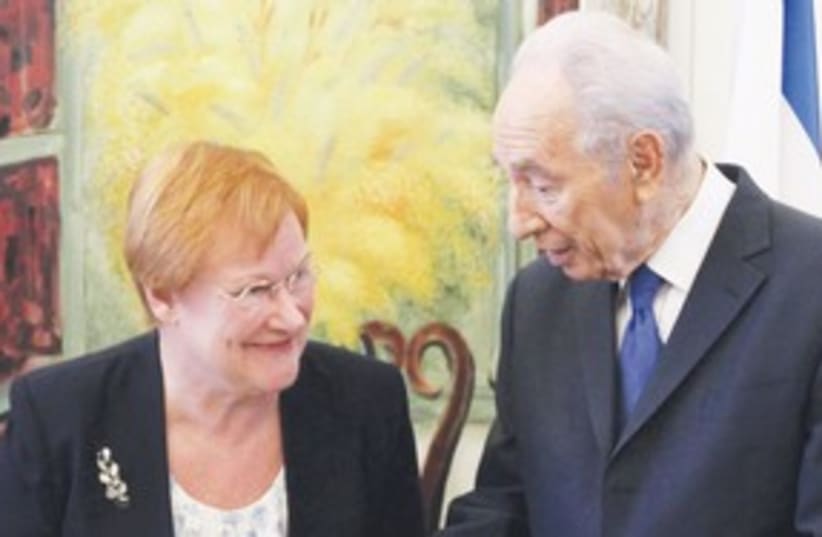RELATED:'Women are not being utilized to bring about peace' Right leaves plenum as Peres preaches peace In his official greeting to Halonen, Peres said that as a Jew, he held Finland in the highest regard for its refusal to obey the Nazi order to expel its Jews.Peres also noted that during the early years of the state, Finland’s Tampella company joined forces with Israel’s Solel Boneh to build much-needed mortars.However, he did not refer to the multimillion-euro trade in defense equipment between Israel and Finland.When speaking of the peace process, Peres said that more creative solutions had to be found, because when there were two opposing positions, you had to look for a third.Israel’s agreement to a two-state solution, he said, was a basic element on which to build peace.Finland knows that a sustainable peace is the key to many issues in the Middle East, and not just the Israeli-Palestinian conflict, said Halonen, who also expressed her pleasure at being back in Israel again.Her country’s first female president, Halonen has visited Israel on previous occasions in other capacities, most recently as foreign minister – a position she held for five years until her election to the presidency in 2000.Halonen, who visited Egypt and Syria a year ago, is now on a tour that includes Jordan, Israel and the Palestinian Authority.She offered Finland’s assistance in helping to further the peace process, noting that the European Union felt that Europe could not be a fortress, and that it had to create a good neighborhood with all its partners.Similarly she hoped to see a good neighborhood in the Middle East, saying it was part of the Mediterranean and therefore a neighbor to Europe. However, she said she was aware that peace was a long and complicated process that did not begin the moment an agreement was signed.“That’s why we’re working together to create a climate for peace,” she said.While eager to enhance Finland’s ties with Israel on all levels, Halonen is particularly interested in increasing scientific and technological cooperation.Halonen told Peres that Israel had many friends in Finland. Although she did not specifically relate to it, the friendship claim could be borne out by the huge pro-Israel rally that took place in Helsinki this past June with the participation of Israeli Ambassador Avi Granot, who is accompanying the Finnish delegation in Israel.Granot is familiar with Beit Hanassi, since prior to his appointment as ambassador to Finland, he was foreign policy adviser to former president Moshe Katsav.
Peres: Open negotiations an impediment to peace
President tells Finnish President Halonen that closed negotiations enable the parties to come to terms.

RELATED:'Women are not being utilized to bring about peace' Right leaves plenum as Peres preaches peace In his official greeting to Halonen, Peres said that as a Jew, he held Finland in the highest regard for its refusal to obey the Nazi order to expel its Jews.Peres also noted that during the early years of the state, Finland’s Tampella company joined forces with Israel’s Solel Boneh to build much-needed mortars.However, he did not refer to the multimillion-euro trade in defense equipment between Israel and Finland.When speaking of the peace process, Peres said that more creative solutions had to be found, because when there were two opposing positions, you had to look for a third.Israel’s agreement to a two-state solution, he said, was a basic element on which to build peace.Finland knows that a sustainable peace is the key to many issues in the Middle East, and not just the Israeli-Palestinian conflict, said Halonen, who also expressed her pleasure at being back in Israel again.Her country’s first female president, Halonen has visited Israel on previous occasions in other capacities, most recently as foreign minister – a position she held for five years until her election to the presidency in 2000.Halonen, who visited Egypt and Syria a year ago, is now on a tour that includes Jordan, Israel and the Palestinian Authority.She offered Finland’s assistance in helping to further the peace process, noting that the European Union felt that Europe could not be a fortress, and that it had to create a good neighborhood with all its partners.Similarly she hoped to see a good neighborhood in the Middle East, saying it was part of the Mediterranean and therefore a neighbor to Europe. However, she said she was aware that peace was a long and complicated process that did not begin the moment an agreement was signed.“That’s why we’re working together to create a climate for peace,” she said.While eager to enhance Finland’s ties with Israel on all levels, Halonen is particularly interested in increasing scientific and technological cooperation.Halonen told Peres that Israel had many friends in Finland. Although she did not specifically relate to it, the friendship claim could be borne out by the huge pro-Israel rally that took place in Helsinki this past June with the participation of Israeli Ambassador Avi Granot, who is accompanying the Finnish delegation in Israel.Granot is familiar with Beit Hanassi, since prior to his appointment as ambassador to Finland, he was foreign policy adviser to former president Moshe Katsav.